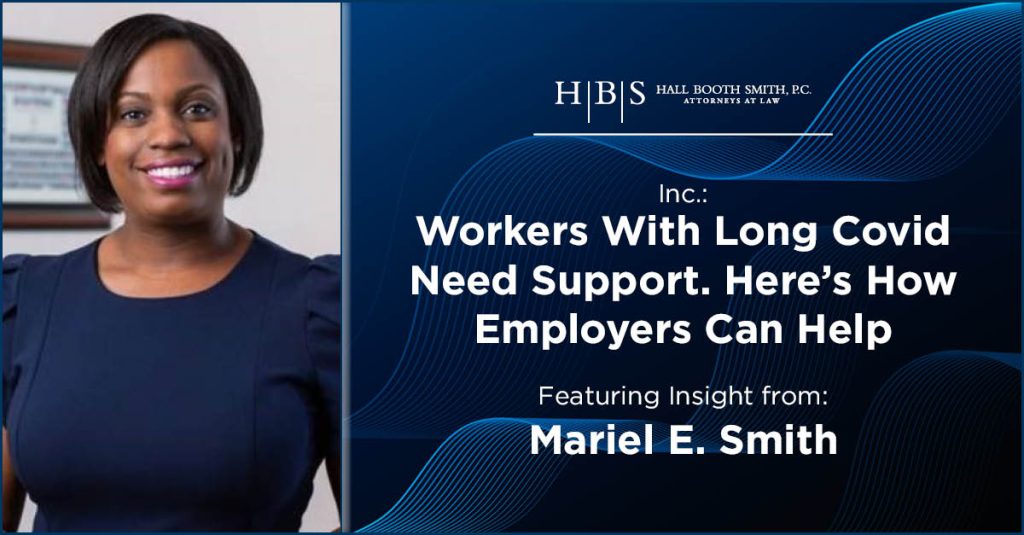
Inc.: Mariel Smith on Supporting Employees with Long-COVID

Hundreds of thousands of dollars spent to no avail. More than 70 rejections from rehabilitation clinics. Even more visits to hospitals, doctors, physical therapists, chiropractors, and other specialists. One long-Covid diagnosis.
That’s been the reality for the Smith family for the past two years and counting, after Jason Smith, a psychologist and professor by trade, contracted long Covid. And it took months for Smith to even receive a definitive diagnosis, according to his twin sister, Fara Smith, who advocates for her brother and oversees his care while also working full time.
“I’m sitting here trying to keep my brother alive while also trying to achieve at work, but I’m just getting doors slammed in my face,” says Fara, who works as a global client executive at the Montvale, New Jersey-based Gotham Technology Group, an IT services and consulting firm.
The Smith family’s first confrontation with Covid happened when Fara and Jason’s mother started exhibiting symptoms at the start of 2020, just before the coronavirus erupted across the globe. But right as their mother started to improve in May 2020, Jason started to get sick and began exhibiting long symptoms around that same timeframe. By October of that year, his symptoms reached a point where his students started to notice them and Jason stepped away from teaching a month later. He taught psychology at Queens College and St. John’s University.
The Smith family is typical of those who have had to deal with the complexity of long Covid. Fara says that many medical experts have no idea how to treat her brother, since long Covid is still not well understood. Doctors have turned them away as the family has sought treatment for Jason’s neurological and physical issue symptoms, which include exhaustion, palpitations, head sensations, neck pain, and insomnia.
After spending five weeks at four different hospitals around August 2021, doctors reached a diagnosis: autoimmune encephalitis, which one of Jason’s doctors believes is a consequence of his long Covid. Before the pandemic, Fara says, her brother was in excellent health.
It’s not yet understood what triggers long Covid, or who exactly is more susceptible to the condition. Groups that seem to be more at risk for long Covid include those with previous medical conditions, those who initially present with five or more symptoms during the onset of Covid-19 itself, poorer socioeconomic groups, and women, according to Charles Glassman, a physician and associate medical director at The Standard, an insurance company based in Portland, Oregon.
Covid-19 is a unique beast. The onset of symptoms differs from patient to patient: Some face debilitating fatigue for weeks or months, while others are asymptomatic. There have been more than 80.5 million Covid-19 cases in the U.S., per the Centers for Disease Control and Prevention’s count, although experts believe that case counts are underreported given the uptick in at-home testing.
There is now growing evidence on how widespread long Covid is. A recent meta-analysis published in The Journal of Infectious Diseases estimated that the global prevalence of long Covid was 43 percent among a pool of 31 studies. But taken together, estimates varied from 9 percent to 81 percent given differences in gender, geography, and study populations.
Some suggest that long Covid helps explain labor shortages in the U.S. It’s estimated that the amount of long-Covid cases in the U.S. falls in the range of 7.7 million to 23 million, according to the U.S. Government Accountability Office. And the number of long-Covid cases begs the question of, what can be done for those people who are in the workforce and want to, or need to, keep their jobs?
Business owners and bosses need to recognize that long Covid is a real condition, says Dan Jolivet, a workplace possibilities practice consultant at The Standard. “[Long Covid] has very clear impacts on the workplace, even when the employee’s condition and symptoms are completely subjective,” he says. “Traditionally, managers and supervisors tend to look at subjective symptoms as personal issues.”
Take the example of an employee struggling with overwhelming fatigue, one of the most common symptoms. If someone tells their employer that they are completely exhausted, it’d be inappropriate for managers to recommend that the employee go to bed earlier to get more rest, Jolivet says. “HR departments need to be very direct in helping their managers recognize that these are medical conditions,” he adds.
There’s also the matter of disability benefits. The Family and Medical Leave Act allows employees to take up to 12 weeks of unpaid leave if they’re unable to work as a result of a serious health condition.
Long Covid can also qualify as a disability under the Americans With Disabilities Act, a law that applies to companies with 15 or more employees. The ADA protects those with disabilities from discrimination, and means that businesses may need to make adjustments to reasonably accommodate employees with long Covid.
“The ADA’s three-part definition of disability applies to long Covid-19 in the same way it applies to any other medical condition,” says Mariel Smith, an employment attorney at Hall Booth Smith. (Mariel Smith is not related to Jason and Fara Smith.) “If a reasonable accommodation is needed and requested by an individual with a disability to apply for a job, perform a job, or enjoy benefits and privileges of employment, the employer must provide it unless it would pose an undue hardship, meaning significant difficulty or expense.”
But attaining disability status isn’t easy–around 70 percent of Social Security Disability Insurance claims are denied annually. Some Covid “long haulers” have sued after being denied long-term disability benefits. Jason Smith has yet to be granted disability status, according to his sister.
Businesses themselves, however, may be presented with a dilemma if accommodating an employee gets to the point of becoming unfeasible from a business standpoint. The harsh truth is that some businesses won’t be able to accommodate Covid long haulers who need to step back from their jobs for a prolonged period of time. “The law measures whether or not the accommodation has an undue hardship,” Mariel Smith says. For example, it could be difficult to accommodate a request asking to limit an employee’s screen time to no more than 20 percent of the workday if they’re a software developer.
If an employee requests accommodations based on a disability, the law requires an employer to engage in an interactive process with that employee and seek further information about the requested accommodation, according to Mariel Smith.
Employers should take care to accommodate their employees as much as possible, though accommodations will largely depend on the symptoms exhibited. Providing ergonomic setups or other accommodations for physical-facing jobs can be very helpful. For example, a business could adjust a facility’s temperature or the lights to hedge against triggering certain symptoms such as migraine headaches. Some long haulers have reported sensitivity to light, for instance, a condition known as photophobia.
Many companies are trying to be flexible by offering modified work schedules, increasing remote work opportunities, or just allocating more sick time to some employees. There’s certainly no regulation against taking care of your employees.


Leave a comment
You must be logged in to post a comment.